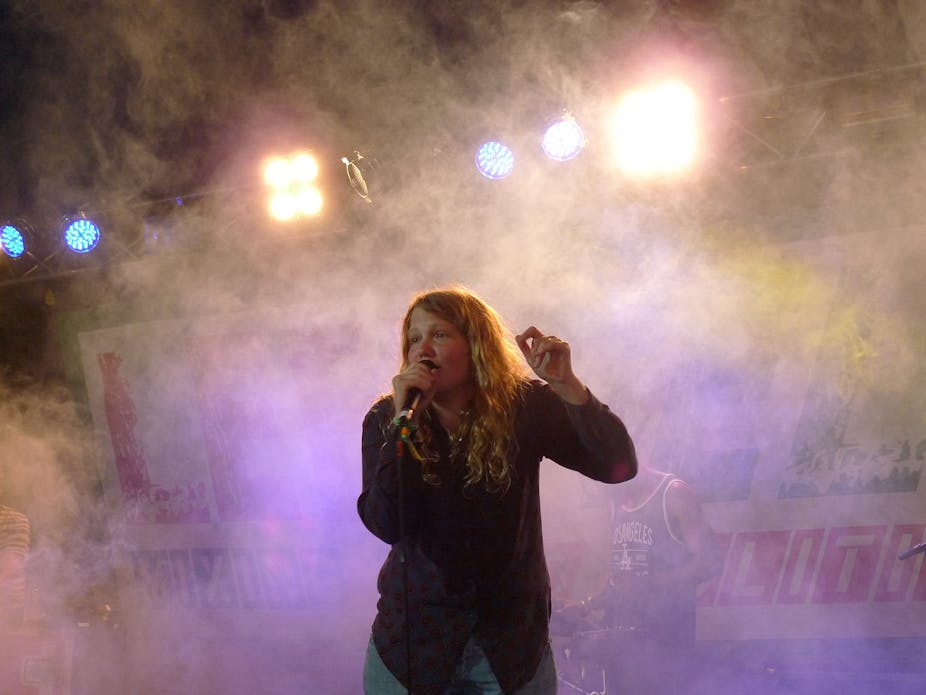When was the last time that you sat down and listened to someone telling you a story? I don’t mean your latest TV box-set instalment, gripping as it might be, or a beer-fuelled pub anecdote. I mean the kind of storytelling that seizes your attention while you sit, silently, unable to move until it’s finished.
For most of us, this kind of tale-telling is something that seems only to belong to childhood. We leave it behind as adults, and perhaps only regain the pleasure if we have children ourselves, and become story-readers (if rarely story-tellers) to small people who hang on every word of a treasured book.
But one of the favourites for the 2014 Mercury Music Prize achieves just this in all her work – which straddles music, performance and written poetry. If you’ve been lucky enough to have been an audience member at one of Kate Tempest’s performances, you will have experienced the gut-punching power of tale-telling at its most raw. The 28-year-old Londoner first grabbed the public’s attention in 2012 with her epic poetic narrative Brand New Ancients. Her spellbinding performances around the country won huge critical acclaim, and in 2013 it catapulted her to be the youngest person to win the the Ted Hughes award.
Her new collection of poetry, Hold Your Own, has been similarly well-received since its publication this month. And now added to the roll-call of achievements is her debut album, Everybody Down, for which she is nominated for the imminent Mercury Prize.
As a poet, rapper, musician, performer, playwright – and soon-to-be novelist – Tempest defies easy categorisation, then. Her work is electrifying, fresh and modern, with its stories of urban life, and hip-hop influences. But the roots of her appeal, and her impact, are very ancient. Both Brand New Ancients and Hold Your Own construct narratives that are heavily indebted to classical mythology.
Brand New Ancients packages its tale of modern struggle and disaffection as an “everyday epic” in which “we are still mythical … still permanently trapped somewhere between the heroic and the pitiful”. Hold Your Own brackets a very personal collection of poems with a retelling of the myth of Tiresias, the blind prophet who changes sex and, like Tempest, becomes “more than the sum of his parts”.
Tempest is far from alone in returning to ancient myth in this way. Many of the most celebrated poets of recent years have woven myth into their work to great effect, from Ted Hughes’s retelling of Tales From Ovid, to Carol Ann Duffy’s collection, The World’s Wife. The timelessness and universal relevance of myth is usually the explanation for its continued re-use. Tempest herself has said that “these are the sort of stories that really infiltrate – about families, and archetypal human tendencies and raw, dark emotions”.
But I think the ancient connections run deeper still. Myth doesn’t only offer Tempest story material – it connects her, and by extension us, her audience, with a world in which the “telling” of poems (as Tempest herself tends to describe it) was part of everyday life. For both the Greeks and Romans, poetry lived not primarily as words on a page (or papyrus roll), but as a live performance, whether in small, private settings, or public recitations. Particularly in the case of the great epics, like Homer’s Iliad or Virgil’s Aeneid, poetry was something to be listened to, and experienced in the company of others.
The power of Tempest’s work, then, lies in its ability to return us to the position of ancient audiences, to the position of our childhood. She allows us to experience poetry as something much more than just literature. Her stories and songs are far from being inert words on a page – they live and move, capturing our attention with a pulse and a melody.
Nor is this a story-telling designed for mere entertainment or escape. Just as the classical epics fulfilled an important socio-political role – contributing to a sense of national identity, for example – Tempest, too, confronts us with the powerful reality and disaffection of contemporary life. The wrenching “Ballad of a Hero”, towards the end of Hold Your Own, for example, tells the story of a soldier’s return home to his family – “but the men who send the armies in will never hear him cry”.
Kate Tempest, then, is a voice that demands to be heard. And while the steady flow of prizes and accolades – hopefully to which the Mercury will soon be added – will no doubt attract new audiences, it is the spellbinding effect of her words and her performance that will keep them listening.

